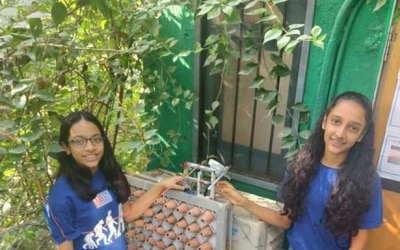Who won the World Robot Olympiad 2020?

As climate change rattles the world, technology has come to the fore to help the environment. Over the years, youngsters around the world have come up with different innovations to do their small bit for the environment. Two such young minds are Prisha Patel (12) and Antara Patel (11) from Mumbai, India.
The students of Jamnabai Narsee School, Mumbai, won the recently concluded World Robot Olympiad held in Canada. Antara and Prisha formed Team Technonerds under the tutelage of On My Own Technology (OMOTEC), Mumbai, and the team was placed first in the Open Category of the Olympiad. Climate Squad, which was the theme for this year's competition, required the two to innovate and design a solution to a climate problem. "We are proud to have represented India in the competition especially because our solution helps the environment." says Prisha, one half of Team Technonerds.
Their idea
With the theme in mind, the girls started to look for a solution that can help the environment. And what better way than starting with appliances in one's own home? The girls looked at appliances used daily by people and thought of a way to improve the efficiency of a device and reduce electricity consumption. They zeroed in on the air conditioner as it consumes electricity the most, while also letting out hot air from the outdoor unit. The girls started devising a solution to cool this hot air and reduce the impact of air conditioners on the climate. After much research they finalised on using clay cones to cool down the air.
How it works
The girls devised a system called Aqua Clay Atmosphere Cooler or ACsquare, which uses a natural filtering screen made using clay cones arranged in an aluminium frame. The cones on the screen are kept moist with recycled water, and as hot air passes through these moist cones, it significantly cools down. The girls used the concepts of Boyle's Law & Venturi Effect to select the shape and size of the cones. Temperature and humidity sensors connected with an Arduino circuit (robotic circuit) were used to keep track of the performance of the AC and the filter. With help from OMOTEC the two developed an app with MIT App Inventor, using which one can get full information on all the testing parameters directly on the phone. The app gives data which allows the user to set the correct temperature for optimum cooling and energy efficiency.
According to Prisha, the girls were very happy to come up with a solution to help the environment using clay, which is a traditional material used in India for hundreds of years. This also made their solution more eco-friendly and sustainable.
The only all-girl team
"I love innovating and coming up with different solutions”, says Antara. Prisha and Antara took a liking for STEM, a curriculum based on the idea of educating students in four specific disciplines - Science, Technology, Engineering and Maths - early on and have been attending classes at OMOTEC for the past four years. The two have competed in several competitions over the years. Last year, Prisha was part of a team that represented India at the First Lego League in Lebanon Antara meanwhile represented the country with her team in Turkey.
The World Robot Olympiad was the second time the two were coming together for a competition. But this time, the two of them were very excited as they were one among a handful of all-girl teams in the competition. However, they were really happy to see more girls taking part in STEM. "Compared to the earlier years, participation of girls has increased a lot." says Antara.
When quizzed about STEM and the prospects of more children taking it up. Prisha states, "The future of the world is technology and we have enjoyed learning STEM. We are sure that a lot of others who haven't had the chance to take up STEM will love it if they are given a chance." The girls believe schools play a huge role in encouraging children to take up STEM.
The two now look forward to developing a career in STEM and competing in more competitions. Moving ahead, Antara and Prisha would love to solve problems of a much larger scale than the ones they are working on currently.
Picture Credit : Google